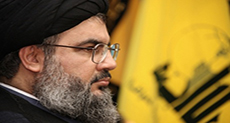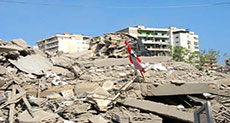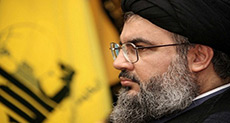Olmert`s ratings fall after Lebanon war
Source: Tayyar.org-AFP, 22-9-2006
"Israelis" would vote Ehud Olmert out of office if elections were held now, polls indicated Thursday, as the defiant prime minister defended his performance in the Lebanon war and lashed out at his critics.
In newspaper and TV interviews marking the Jewish New Year, Olmert said he had no doubt
"Israel" won this summer`s war against Hizbullah - even though the army was unable to stop rocket attacks on "Israel" during 34 days of fighting and failed to win the release of two soldiers captured by the Lebanese occupation-resistance fighters.
Olmert was evasive when asked whether Nasrallah remained a target for assassination. However, army chief Lt. Gen. Dan Halutz suggested "Israel" was no longer hunting Nasrallah, saying his fate "won`t depend on us."
In the Gaza Strip, five Palestinians were killed by army fire - three alleged members of a rocket squad, a gunman and a 37-year-old woman.
Two polls published Thursday indicted Olmert was rapidly losing support and archrival
Benjamin Netanyahu, leader of the hawkish Likud, was poised for a comeback.
A survey by the Dialog polling company, published in the Haaretz newspaper, showed 68 percent of "Israelis" were unhappy with Olmert, compared with 40 percent on Aug. 1, midway through the war. Just 22 percent were satisfied with his performance, compared with 48 percent in the previous poll.
The survey of 507 people had a margin of error of plus or minus 4.8 percentage points.
If an election were held today, Likud would double its strength, winning 24 of 120 parliament seats - making it the largest party and Netanyahu the possible premier - while Olmert`s centrist Kadima would fall from 29 to 16 seats, according to the poll. Elections are not scheduled until 2010, but no "Israeli" government in the past decade has completed its four-year term.
In a survey in the Yediot Ahronot daily, 27 percent said Netanyahu was most suited to be prime minister, compared to just 7 percent who chose Olmert. The Dahaf poll of 499 people had an error margin of plus or minus 4.5 percentage points.
After winning March elections, Olmert set out with confidence, saying he would draw "Israel's" final borders by unilaterally pulling out of much of the
West Bank. However, his aides have acknowledged that the Lebanon war squashed that plan and stripped Olmert`s government of its central mission.
Olmert, Halutz and Defense (War) Minister Amir Peretz have been criticized for their wartime performance. Opponents say they were indecisive and confused, defined unachievable war goals - such as crushing Hizbullah - and that they negotiated a bad cease-fire deal.
Digging in, Olmert defended himself in a round of New Year`s interviews.
"I have no doubt we won the war," he was quoted as telling the Maariv daily, adding that his critics were inexperienced and "harbingers of doom."
Two of his harshest detractors, former army chiefs Shaul Mofaz and Moshe Yaalon, were driven by bitterness over not being more successful at politics, he said. Mofaz, also a former defense (war) minister, is a leading Kadima minister.
Olmert also responded to charges that he was too inexperienced. "I did not feel that I had to deal with decisions that I was incapable of handling," he said.
The prime minister told Channel 2 TV that Peretz would remain in the job. He also defended one of the most controversial decisions of the war - to widen a ground offensive in Lebanon after the U.N. approved a cease-fire. Thirty-three soldiers were killed in that offensive, which Yaalon and other critics said was launched for political, not military reasons.
Olmert said Thursday that the army had asked for the offensive to improve "Israel's" positions. However, "Israel" quickly pulled back after the cease-fire took hold and was expected to finish withdrawing from Lebanon in the coming days.




